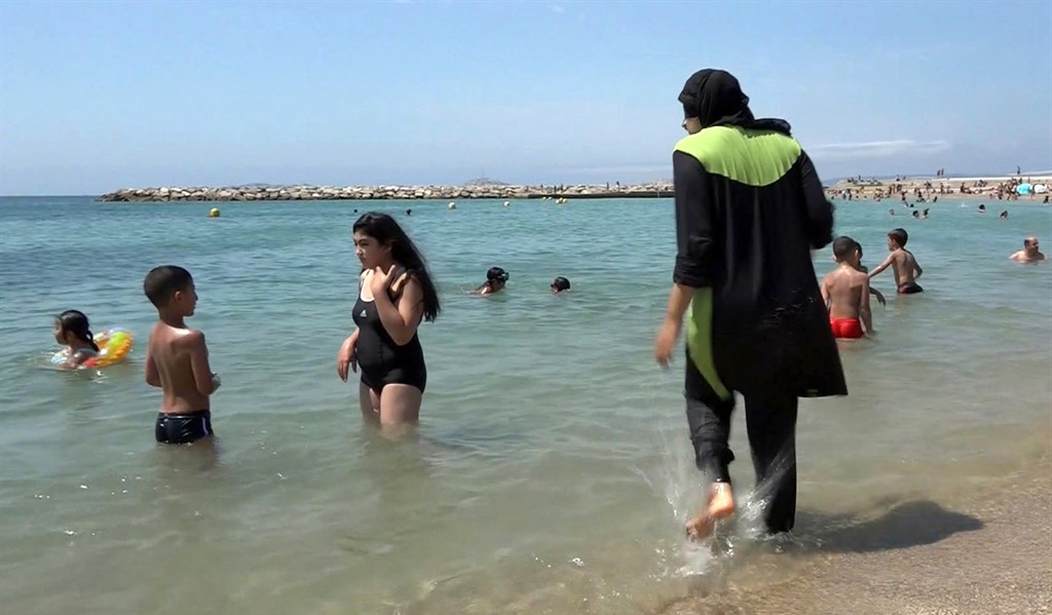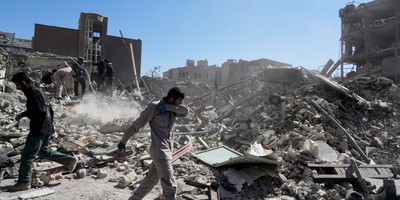France has been seized by a silly hysteria over the burkini, prompting me to wonder when Europeans will get serious about their Islamist challenge.
For starters, what is a burkini? The word (sometimes spelled burqini) combines the names of two opposite articles of female clothing: the burqa (an Islamic tent-like, full-body covering) and the bikini. Also known as a halal swimsuit, it modestly covers all but the face, hands and feet, consisting of a top and a bottom. It resembles a wetsuit with a head covering.
Aheda Zanetti of Ahiida Pty Ltd in Australia claims to have coined the portmanteau in 2003, calling it "smaller than a burka" while "two piece like a bikini." The curious and sensational cross of two radically dissimilar articles of clothing along with the need it fit for active, pious Muslim women, the burkini (as Ahiida notes) was "the subject of an immediate rush of interest and demand." Additionally, some women (like British cooking celebrity Nigella Lawson) wear it to avoid a tan, while pious Jews have adopted a variant garment.
In 2009, a public swimming pool in Emerainville, France, excluded a burkini-wearing woman, on the grounds that she violated pool rules by wearing street clothes. But burkinis only erupted into a national political issue on Aug. 12 when the mayor of Cannes, a resort town on the French Riviera, banned burkinis (without legally defining what exactly they are) on the Cannes beaches because it represents Islamism. A court then confirmed his ban and the prime minister of France, Manuel Valls, further endorsed it (on the grounds that the burkini is a religious expression that has no place on the beach) as did François Fillon, a likely candidate for president next year. Thus encouraged, other French municipalities followed suit, including the city of Nice, plus another nine towns in the Alpes-Maritimes Department as well as five towns in the Var Department.
This development astonishes me, someone who has argued that the burqa (and the niqab, a similar article of clothing that leaves a slit for the eyes) needs to be banned from public places on security grounds. Those formless garments not only hide the face, permitting criminals and jihadis to hide themselves but they permit the wearer to hide, say, an assault rifle without anyone knowing. Men as well as women use burqas as accessories to criminal and jihadi purposes. Indeed, I have collected some 150 anecdotes of bank robberies, abductions, murders, and jihadi attacks since 2002; Philadelphia has become the Western capital of burqas and niqabs as criminal accessories, with at least 34 incidents in 9 years.
Recommended
In contrast, the burkini poses no danger to public security. Unlike the burqa or niqab, it leaves the face uncovered; relatively tight-fitting, it leaves no place to hide weapons. Men cannot wear it as a disguise. Further, while there are legitimate arguments about the hygiene of large garments in pools (prompting some hotels in Morocco to ban the garment), this is obviously not an issue on the coastal beaches of France.
Accordingly, beach burkinis should be allowed without restriction. Cultural arguments, such as the one made by Valls, are specious and discriminatory. If a woman wishes to dress modestly on the beach, that is her business, and not the state's. It's also her prerogative to choose unflattering swimwear that waterlogs when she swims.
The Islamist threat to the West is very real, from the Rushdie rules to sex gangs, taharrush, polygyny, honor killings, partial no-go zones, and beheadings. With the influx to Europe of millions of unvetted Muslim migrants, these problems will grow along with the number of Islamists. Nerves are on edge and the political scene is changing rapidly, as symbolized by half the vote for president of Austria recently going to a hardline anti-immigration politician.
Issues concerning Islam are arguably Europe's number-one concern, ahead even of the European Union and the financial crisis; they need to be dealt with by confronting real problems, not by focusing on symbolic irrelevancies such as burkinis, halal shops, and minarets. Burqas and niqabs must be banned (as the German government may soon do), freedom of speech about Islam and Muslims must be reconfirmed, Saudi and Iranian funding for religious purposes must be cut, and a single legal code must apply to all.
So, my advice: focus on these real problems and let Muslims wear what they wish to the beach.

























Join the conversation as a VIP Member